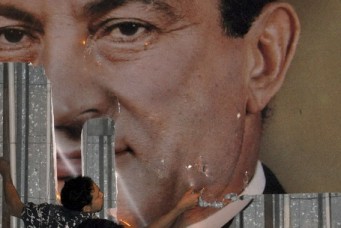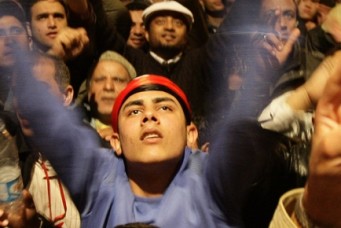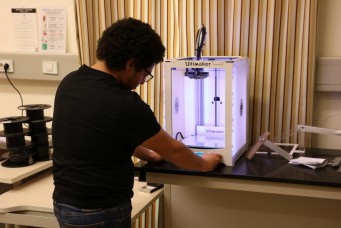A University and a Revolution
Three young Egyptians talk about their roles in the revolution
Lara El-Gibaly, a junior at the American University in Cairo, eagerly anticipated the start of the Spring Semester. A nineteen-year-old journalism major, she was preparing to take the helm as editor in chief of AUC’s student newspaper, the Caravan. During the winter break, she had an internship at the Cairo Bureau of Al Jazeera, the Qatar-based satellite television news network. Instead of performing mundane chores like shuffling through incoming faxes, however, she suddenly found herself doing something quite extraordinary: covering a revolution.
No journalism class could have prepared her for what happened next. As the mass uprising got underway in Tahrir Square, El-Gibaly choked back the effects of tear gas that enveloped protesters emerging from a nearby mosque in defiance of baton-wielding police. In the days that followed, she served as a field producer for profiles of youth activists and a story on a fourteen-year-old boy shot to death while out buying bread. At one point, she and other Al Jazeera personnel went into hiding after state security operatives moved in to shut down the Al Jazeera bureau. “We had to put on disguises and leave the hotel with crazy exit plans, things I imagined only happen in movies,” she recalls.
As the revolution tugged at El-Gibaly’s patriotic heartstrings, she remained determined to fulfill her professional responsibilities. “There were times I wanted to participate in the infectious chants,” she says. “I’d be tapping my foot and snapping my fingers to the beat, but I had to tell myself what I was doing was contributing just as much to the revolution—getting the truth out there.”
“I suddenly have a sense of ownership in this country and I have a sense of purpose. I need to rebuild Egypt. That’s what I want to spend my life doing.”
El-Gibaly was one of countless AUC students, professors, staff members, and alumni who participated in one way or another in Egypt’s remarkable eighteen-day revolution in January and February. At times, the downtown campus directly on Tahrir Square became a battleground; without the university’s consent, security forces used rooftops to fire on demonstrators below. Wael Ghonim, a Google executive who earned an MBA from AUC in 2007, became a symbol of the revolution after organizing the protests via Facebook and being detained for twelve days. He shot to international prominence after giving an emotional interview about his role to Egyptian television presenter Mona El-Shazly, another AUC graduate.
El-Gibaly’s friend and classmate, Sarah Abdelrahman, twenty-three, also found unexpected fame—she appeared with other students on the cover of TIME magazine, illustrating a story about a generation changing the world. A drama student more accustomed to memorizing lines than dodging tear gas canisters, she quickly took to the streets and started learning how to make Molotov cocktails.
Abdelrahman relates a tale of personal change that is echoed by many young Egyptian revolutionaries. She recalls that on the eve of the protests, she had voiced her decision to leave Egypt upon graduation, to pursue studies and possibly her entire future abroad. Filled with national pride amid the revolution, however, she changed her birthdate on her Facebook page to January 25 to symbolize her rebirth as an Egyptian citizen. “Fear controlled us, but not anymore,” she explains.
“I suddenly have a sense of ownership in this country and I have a sense of purpose. I need to rebuild Egypt. That’s what I want to spend my life doing.”
Gigi Ibrahim, twenty-four, made such a commitment after graduating from AUC in 2010. A self-styled activist and citizen journalist, recognizable by her Palestinian keffiyeh, she organized labor strikes at the university prior to the revolution. Living in Tahrir Square for the eighteen days of protests, she amassed ten thousand followers on Twitter, spoke as an expert commentator on international news networks, and became a subject in the PBS Frontline documentary Revolution in Cairo, aired in late February. “The celebrity factor is a little weird,” Ibrahim says. “This is something I have always done and will continue to do, whether I have media attention or not. Usually people just complain about problems. They take a stand but just watch. I like to lead by example and be the change I want to see.”
In common with many AUC students and recent graduates, Ibrahim is experiencing a dual transformation—as an Egyptian citizen in the revolution, and as a daughter in her Egyptian family. “I struggled every day with my family, especially my dad, who didn’t believe in what I did,” recalls Ibrahim, who earned a degree in political science. She is pleased to report success on both fronts. “They now support me,” she says. “That’s a huge relief and victory. I feel blessed and humble and lucky to have witnessed and taken part.”





